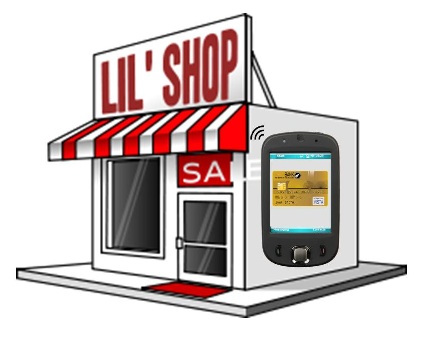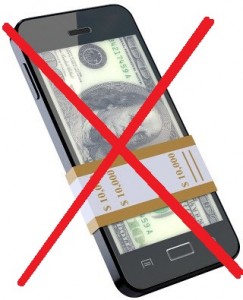Small merchants have yet to show enthusiasm for mobile payments
Mobile commerce is having difficulty gaining traction among small businesses in the United States. According to the U.S. Census Bureau, these companies account for more than 90% of the businesses in the country, but they have yet to show significant support for mobile payments. Large retailers and banks, however, have become quite enthusiastic about mobile commerce, offering consumers services that allow them to manage their money and shop directly from the smartphones and tablets.
NFC technology proves somewhat unattractive for small businesses
One of the reasons that small businesses may not be supporting mobile payments is because NFC technology comprises much of the mobile commerce infrastructure. NFC technology allows digital information to be transmitted over short distances and it has become a powerful tool for the mobile payments space. Most prominent payment services, such as Apple Pay, make use of this technology in order to facilitate transactions, but this requires that physical merchants have an NFC-enabled terminal that is able to interact with this technology.
EMV standards may drive the adoption of mobile commerce among retailers
 For small businesses, adoption of NFC technology may be too costly, which has stunted the growth of mobile commerce among some merchants. An alternative, however, is new Europay, MasterCard, and Visa (EMV) standards, which retailers are required to embrace by October 1. These standards allow all retailers to adopt new payment terminals that support EMV cards. This will allow retailers to also embrace mobile payments, because EMV-enabled cards will be associated with the payment services being used by consumers.
For small businesses, adoption of NFC technology may be too costly, which has stunted the growth of mobile commerce among some merchants. An alternative, however, is new Europay, MasterCard, and Visa (EMV) standards, which retailers are required to embrace by October 1. These standards allow all retailers to adopt new payment terminals that support EMV cards. This will allow retailers to also embrace mobile payments, because EMV-enabled cards will be associated with the payment services being used by consumers.
Small retailers have little interest in EMV standards
While small retailers will also have to adopt EMV-enabled terminals, many have yet to outline plans to do so, partly due to high costs. If retailers do not embrace the new EMV standards, they will be held liable for any fraudulent purchases that are made through their establishments. Once small retailers begin feeling the consequences of these fraudulent purchases, however, they are likely to adopt the standards and begin acquiring EMV-enabled terminals.
Android Pay will not charge transaction fees to card providers
Google has announced that it will not be charging transaction fees on mobile payments made through its new Android Pay platform. The move has to do with competing more aggressively with Apple, who has found significant traction in the mobile payments space. Google will not be receiving a percentage of transactions processed from payment cards, such as MasterCard and Visa, which may make Android pay significantly more attractive to merchants interested in the mobile space.
Tokenization may be the death of transaction fees
Google had initially intended to charge a fee on credit card transactions, as this has become the standard for the mobile payments industry, but opted not to. One of the reasons for this is the growing prominence of tokenization, a security practice that replaces financial information with digital tokens. This practice has been adopted and heavily promoted by both MasterCard and Visa as a way to make mobile transactions more secure. One of the issues with tokenization is that it prevents payment services from charging fees to card providers.
Android Pay may become Google’s default mobile payments platform
 In 2011, Google introduced its Wallet platform, which served as the company’s first entry into the mobile payments sector. Google Wallet experienced a relatively rough launch and has struggled to find traction with consumers since. Over the years, Google has been making changes to its approach to the mobile payments market, and the company now plans to launch, making acquisitions to improve its position in the market. In late 2013, Google acquired Softcard, and the company’s technology was used to develop Android Pay.
In 2011, Google introduced its Wallet platform, which served as the company’s first entry into the mobile payments sector. Google Wallet experienced a relatively rough launch and has struggled to find traction with consumers since. Over the years, Google has been making changes to its approach to the mobile payments market, and the company now plans to launch, making acquisitions to improve its position in the market. In late 2013, Google acquired Softcard, and the company’s technology was used to develop Android Pay.
Downfall of transaction fees may bring more merchants into the mobile payments market
Transaction fees have been a significant challenge for retailers and card providers interested in the mobile payments space. While such fees are nothing new in the world of commerce, the mobile sector is still an unproven market, despite the promise that it shows. As such, merchants are somewhat uncertain about entering in the mobile payments space, expressing concern that this sector may be little more than a passing fancy for most consumers.
 For small businesses, adoption of NFC technology may be too costly, which has stunted the growth of mobile commerce among some merchants. An alternative, however, is new Europay, MasterCard, and Visa (EMV) standards, which retailers are required to embrace by October 1. These standards allow all retailers to adopt new payment terminals that support EMV cards. This will allow retailers to also embrace mobile payments, because EMV-enabled cards will be associated with the payment services being used by consumers.
For small businesses, adoption of NFC technology may be too costly, which has stunted the growth of mobile commerce among some merchants. An alternative, however, is new Europay, MasterCard, and Visa (EMV) standards, which retailers are required to embrace by October 1. These standards allow all retailers to adopt new payment terminals that support EMV cards. This will allow retailers to also embrace mobile payments, because EMV-enabled cards will be associated with the payment services being used by consumers.
 In 2011, Google introduced its Wallet platform, which served as the company’s first entry into the mobile payments sector.
In 2011, Google introduced its Wallet platform, which served as the company’s first entry into the mobile payments sector. 